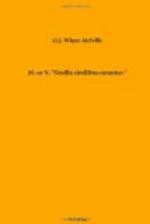You say they ain’t apt to be fatal, doctor—them spells!
Well—but you ain’t never saw him in one yet. They’re reg’lar death-spells, doctor.
Tell you the truth, they was the ‘casion of us j’inin’ the church, them spells was.
Says I to wife—standin’ beside him one day, and he black in the face—says I, “Wife,” says I, “I reckon you an’ me better try to live mo’ righteously ‘n what we’ve been doin’, or he’ll be took from us.” An’, sir, the very nex’ communion we both up an’ perfessed. An’ I started sayin’ grace at table, an’ lef’ off the on’y cuss-word I ever did use, which was “durn.” An’, maybe I oughtn’t to say it, but I miss that word yet. I didn’t often call on it, but I always knowed ’t was there when needed, and it backed me up, somehow—thess the way knowin’ I had a frock-coat in the press has helped me wear out ol’ clo’es. I ain’t never had on that frock-coat sence I was married in it seventeen year ago; but, sir, ever sence I’ve knew the moths had chawed it up, th’ ain’t been a day but I’ve felt shabby.
[Illustration: “She does make ‘im so contented an’ happy.”]
Sir? Yas, sir; we’ve waited a long time. It’s seventeen year, come this spring, sence we married. Our first child could easy ‘a’ been sixteen year ol’, ‘stid o’ two, ef Sonny’d come on time, but he ain’t never been known to hurry hisself. But it does look like, with seventeen year for reflection, an’ nothin’ to do but study up other folks’s mistakes with their childern, we ought to be able to raise him right. Wife an’ me we fully agree upon one p’int, ‘n’ that is, thet mo’ childern ‘r’ sp’iled thoo bein’ crossed an’ hindered ’n any other way. Why, sir, them we ’ve see’ grow up roun’ this country hev been fed on daily rations of “dont’s!” an’ “stops!” an’ “quits!”—an’ most of ’em brought up by hand at that!
An’ so, ez I say, we don’t never cross Sonny, useless. Of co’se when he’s been sick we have helt his little nose an’ insisted on things; but I reckon we ’ve made it up to him afterwards, so’s he wouldn’t take it amiss.
Oh, yas, sir; he called me “daddy” hisself, ‘n’ I never learned it to him, neither. I was layin’ out to learn ’im to say “papa” to me, in time; but I ’lowed I ‘d hol’ back tell he called her name first. Seemed like that was her right, somehow, after all thet had passed ‘twixt him an’ her; an’ in all her baby-talk to him I took notice she’d bring the “mama” in constant.
So of co’se I laid low, hopin’ some day he ‘d ketch it—an’ he did. He wasn’t no mo’ ’n ‘bout three months ol’ when he said it; ‘n’ then, ‘fo’ I could ketch my breath, hardly, an put in my claim, what does he do but square aroun’, an’, lookin’ at me direc’, say “dada!” thess like that.
There’s the secon’ bell, doctor. ‘Sh! Don’t ring no mo’, Dicey! We’re a-comin’!
At the first bell the roller-towel an’ basin gen’ally holds a reception; but to-day bein’ Sunday—




